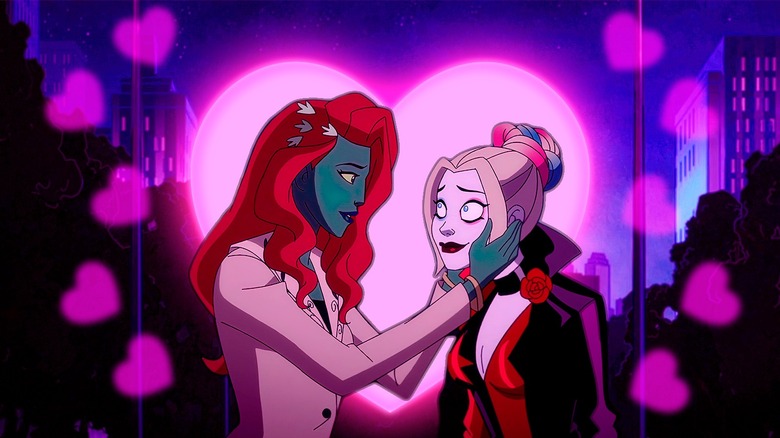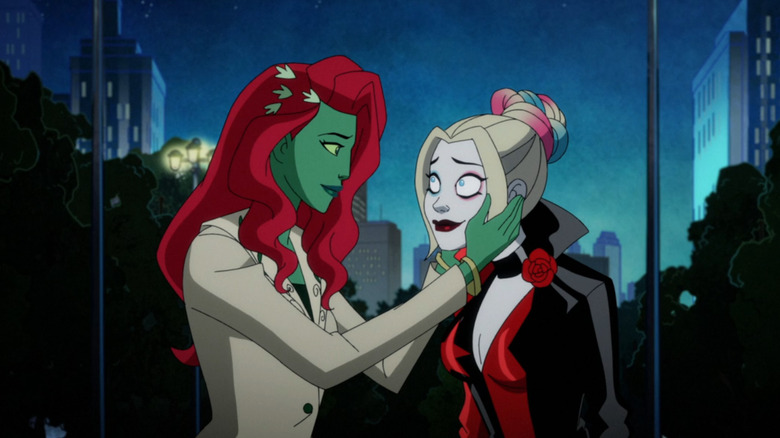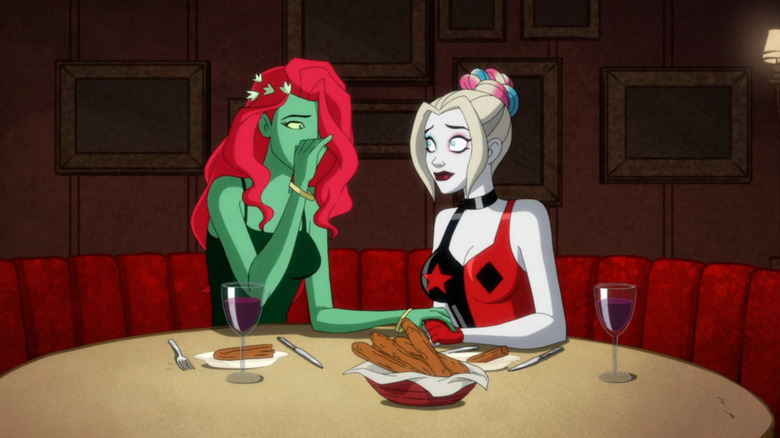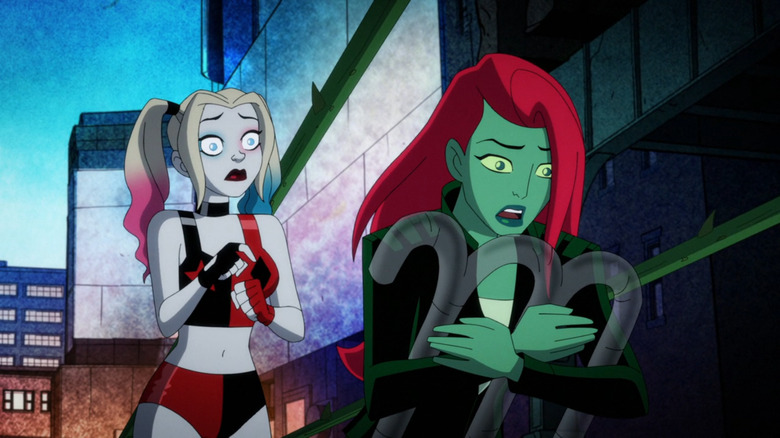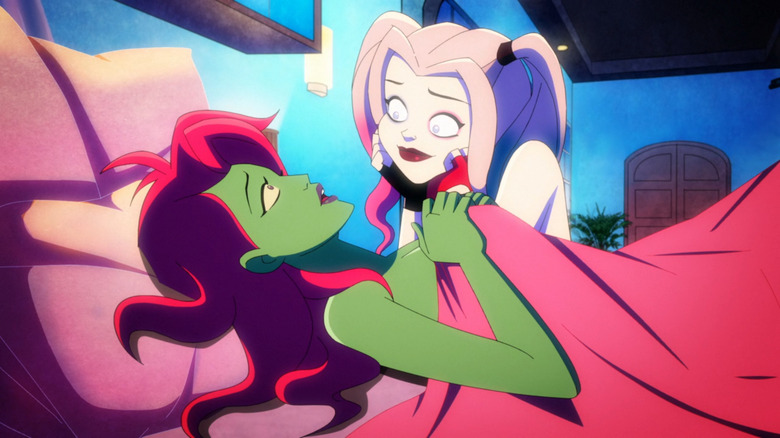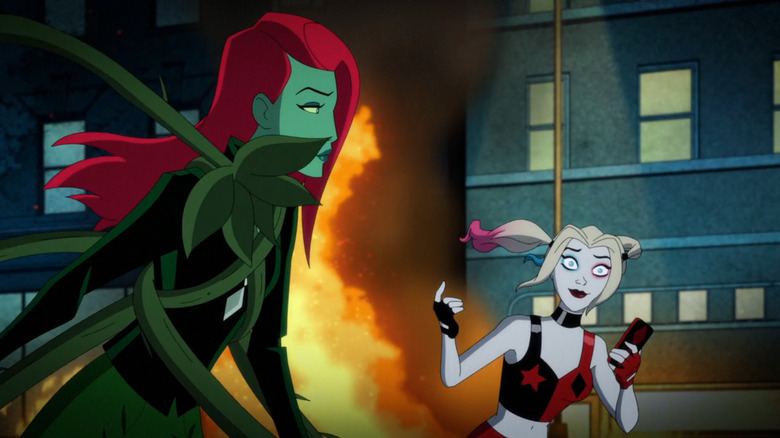The Harley Quinn Valentine's Day Special Proves That Harley And Ivy Have TV's Best Queer Romance
"Harley Quinn" is back for more mayhem with a new Valentine's Day-themed special, and it serves as a victory lap for the animated DC show's central romance.
Over the past three seasons, "Harley Quinn" evolved from a whip-smart parody of the DC Universe into the boldest portrayal of queer love currently on TV. It's a triumph of storytelling, not only because queer relationships in general are hard to come by in popular media, but because Harley Quinn (and to some extent Poison Ivy) has for so long been a blank slate for male writers and animators to project their misogynistic hangups and fantasies onto. However, after making Harley Quinn (Kaley Cuoco) and Poison Ivy's (Lake Bell) love official during Season 2, Season 3 destroyed expectations and smashed established tropes with a black-and-red baseball bat at every turn.
Couples on sitcoms tend to have blowout fights, hide secrets, and generally be terrible. Queer couples — those that aren't broken up or killed off — tend to be even messier and more dysfunctional. But "Harley Quinn" gave audiences two lovers who resolve their differing needs through open, honest communication, a dose of wholesomeness amid an otherwise blue and brutal show.
Now, with "Harley Quinn: A Very Problematic Valentine's Day Special," the series returns to prove that it has the best queer romance on TV with a special that pays off all the work the previous three seasons did to get there. In doing right by its characters, avoiding and subverting common queer media tropes, and by presenting a sincere, relatable same-sex relationship, "Harley Quinn" once again shows us how it's done.
Harley Quinn dodges negative tropes and gives truly positive LGBTQ+ representation
The simple fact that "Harley Quinn" chose not to make a Christmas or Thanksgiving special, but rather, a Valentine's Day-centric installment, is unorthodox — and that's the point. It's a celebration of the show's heart and soul. Few other shows depict a lesbian relationship, let alone revolve around them, and we might do well to ask why a show with Batman in it has been the first to break so much ground.
"Harley Quinn: A Very Problematic Valentine's Day Special" is a victory lap after a marathon of audacious storytelling, and the show earned it, if for no other reason than because HarlIvy is still an item after a full season. The stakes of Season 3 never revolved around whether they might break up, a near miracle in a world where same-sex love is immediately threatened as soon as it appears onscreen. When that threat is not related to physical violence or death, it is often connected to odious stereotypes and false assumptions, such as that LGBTQ+ people are promiscuous or fickle. Existing representation of LGBTQ+ people in popular media is too often laden with negative associations and stereotypes that manifest in the form of tropes.
Notably, tropes are not inherently bad or wrong. Rather, they form when something happens enough times in enough different stories that it becomes an identifiable pattern. What makes a trope troubling is when it conforms to negative perceptions about a group of people. "Harley Quinn: A Very Problematic Valentine's Day Special" swings Harley's bat for the fences and knocks one out of Gotham Stadium, and the first way it does so is by doing something the series has always excelled at: bucking those tropey expectations for queer storytelling.
Harley and Ivy avoided queerbaiting
Many gay characters never get to actually be gay. In 2007, JK Rowling declared Dumbledore canonically gay, but in the 16 years since, that fact has only been alluded to in a single film. And in "Supernatural," when Castiel (Misha Collins) declared his love for Dean (Jensen Ackles) after 15 seasons, he was promptly sucked directly into what fans call "Super-Hell" (prompting understandable fan outrage). Both of these follow a trope called "queerbaiting," in which same-sex romance is teased at but never realized onscreen.
Harley and Ivy have long been hinted at as being queer in various media. But on-screen, it wasn't until her self-titled HBO Max series that Harley and her eco-terrorist bae were given the space to explore their romance authentically. In a world where LGBTQ+ characters are often thrown into a show or movie for the sake of tokenization, as if to say, "Here's some representation, are you satisfied now?," this animated series deeply cares about its characters and their emotional realities, giving a defiant middle finger to queerbaiting.
From the outset, "Harley Quinn" took responsibility with its subject matter. Season 1 saw Harley break up with the Joker (Alan Tudyk) and deal with the emotional fallout. After drunkenly hooking up midway through Season 2, Harley tells a panicking Ivy, "You're here, you're queer, get used to it." And indeed, the show paid off all that buildup in Season 3, exploring how these two very different people navigate a relationship with each other. What are their needs? How do their personalities work together and what accommodations will each need to make for the other?
The "Valentine's Day Special" draws again from that fertile wellspring of storytelling, only even more over-the top. It emphatically declares that Harley and Ivy's love is real and should be taken seriously. It's amazing because it's more of the same.
Harley Quinn doesn't bury its gays
Too often, writers cop out of queer romance by killing off an explicitly queer character. Usually, the death happens moments after the queer character has come out as definitely queer or has found love. This happens with such frequency that it's been dubbed the "bury your gays" trope. The examples are too numerous to list here, but a few include: Castiel literally getting dragged into "Super-Hell" seconds after professing his love for Dean, Oberyn Martell (Pedro Pascal) being slain in "Game of Thrones," and Villanelle (Jodie Comer) being shot minutes after professing her love to another woman in "Killing Eve."
Since getting together at the end of Season 2, it's everyone around them, rather than Harley and Poison Ivy, who need to fear for their lives. These are supervillains, after all. "Harley Quinn" did kill Poison Ivy in Season 1, but she came back to life thanks to the power of Harley's tears. Moreover, Season 3 proved that wasn't even on the table. Love triumphs over all. Grievous injury isn't out of the question, of course.
"A Very Problematic Valentine's Day Special" is a reaffirmation of the show's commitment to its core relationship. Living, in itself, is an act of queer rebellion, and these gays refuse to die. Instead of a tragic ending, they will have incredible sex and commit massive acts of property destruction, the very literalization of the revolutionary, queer anarchist slogan "be gay, do crime."
Harley Quinn celebrates queer pleasure
There's no queer media trope "A Very Problematic Valentine's Day Special" smashes more than that of the desexed queer couple. Often, queer characters in media exist to be sassy and fun, to the tropes of gay best friend or advice-giving lesbian — that is to say, they exist to be palatable to straight people, but it seems as if writers would rather die than explore a queer character's sex life. Indeed, the recent wave of legislation in the United States which seeks, on the basis of bad faith arguments about protecting the innocence of children, to ban all mention of queerness from schools and libraries speaks to the way in which LGBTQ+ individuals are simultaneously hypersexualized and denied sexual expression. Meanwhile, superhero media is notably sexless even for the straight heroes, most of whom never go further than a kiss (an issue which cropped up during the production of "Harley Quinn" Season 3 when Warner Bros. refused to allow a scene depicting Batman pleasuring Catwoman. Their rationale? "Heroes don't do that").
The "Harley Quinn" special not only celebrates queer sexual pleasure in all its volatile, transgressive physicality, it's what leads into the big third act battle. In her quest to give Ivy "the best VD ever," Harley buys a potion that gives her plant-loving bae the best orgasm of her life. That, in turn, creates the real climax, as Ivy's big O causes her to release pheromones that turn the population of Gotham into sex-crazed maniacs. More concerningly, they turn a frustrated Bane (James Adomian) into a skyscraper-sized kaiju who destroys Gotham by humping buildings into rubble.
The emphasis on sex isn't just for laughs (despite being outrageously funny), but to plant a flag that exclaims — without shame — the joy of queer sex.
Harley Quinn's comic book chaos balances a heartfelt romance
A lot of the charm "Harley Quinn" deals out in spades comes from the juxtaposition between the genuinely emotional love story and the comic book chaos unfolding everywhere around it. One moment, Harley and Ivy are decapitating a fossil fuel CEO. The next, they're navigating their relationship with open-ended communication and vulnerability. It simply shouldn't work as well as it does, but those two extremes create a balance. At their core, these two powerful supervillains are experiencing the same relationship struggles as the rest of us.
Not only does that polarized approach work, it's a comedic engine for delivering jokes at breakneck speed. The last tired trope the show bucks is the notion that queer romance has to be sad in order to be serious. "Harley Quinn" venerates queer joy, expressing it as a laugh covered in glitter and blood.
That dichotomy is on full display in "A Very Problematic Valentine's Day Special," which turns the wacky super-villainous antics up to 11 and places HarlIvy's competing needs at the fore. As they battle a giant, horny Bane amid a city dosed with lust pheromones, Ivy empathizes with Harley's desire to make her happy, but also makes it clear that she hasn't been listening to Ivy's needs. In the end, their bond is strengthened. In the burning city, they kiss amid the rubble.
Few relationships in media, queer or not, represent the realities of a relationship with such emotional maturity. And sure, conflict is what makes a story compelling, but "Harley Quinn" has consistently proved that toxic relationships do not hold sole claim to good storytelling. With "A Very Problematic Valentine's Day Special," this incredibly raunchy yet heartwarmingly sweet show proves it not only has the best queer romance on TV, but maybe the best romance, period.
